I Love You, Ronnie (15 page)

Sometimes, though, at the most important moments in the president’s life, you just can’t be there. Try as you might, you can’t always protect him from the outside world.
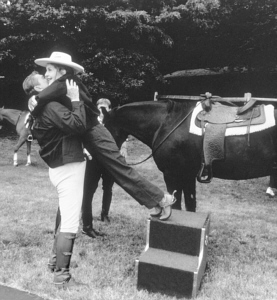
I’m getting off the horse at Camp David, in the way Ronnie liked.
M
arch 30, 1981, began like a perfectly normal day. Around noon, I went to a luncheon in an art gallery in Washington. When it came time for dessert, I suddenly had a strong feeling that I wanted to get back to the White House. I’d never felt anything like that before—and I haven’t since—so I made my excuses and left. When I got back to the White House, I went up to the third floor, where we were in the midst of renovations. I was talking in the solarium with Rex Scouten, the chief usher, and Ted Graber, our decorator, when I saw George Opfer, the head of my Secret Service detail, standing at the bottom of a ramp that had been installed for President Roosevelt. He gestured to me to come down.
That’s funny. I thought. Why doesn’t he come up?
I went down.
“There’s been a shooting,” he said. “But the president’s all right.”
I was already headed for the elevator.
“He wasn’t hit,” he kept saying. “He’s all right.”
“George,” I said, as we went downstairs. “I’m going to the hospital.”
“You don’t have to,” he said. “He’s all right.”
“George,” I said. “I’m going to the hospital, and you either get me a car or I’ll walk.”
It seemed to take forever to get to the hospital. Word of the shooting was out by that time, and the traffic had gotten very bad. When we finally made it there, Mike Deaver was waiting for me. “He’s been hit,” he told me. He suggested that we go into a little room and wait, which we did.
“Let me see him,” I said.
“You can’t see him now. They’re working on him,” he answered. “But he’s all right.”
The obvious question then was: “Well, if he’s all right, why can’t I see him?”
“You just can’t,” was the answer. “Not yet. They’ll let you know when it’s the right time.”
“Mike,” I said. “You’ve got to get me in. He’s got to know I’m here. They don’t know how it is with us.”
Mike said he’d see what he could do.
I was terrified. I was also feeling like this couldn’t be happening. John Simpson, a good friend, who was head of the Secret Service at the time, and Mike Deaver stayed with me. Outside the room, there seemed to be policemen everywhere, and they were yelling, “Get these people out of here!” There was so much noise. I kept wondering if this was what it had been like when President Kennedy was shot.
Finally, they came and told me that I could see Ronnie. I went into the emergency room and he was lying there with an oxygen mask over his face. When he saw me, he lifted it up and said, “Honey, I forgot to duck.” He was the color of paper—just as white as a sheet, with dried blood around his mouth. I held back my tears and said, “Please don’t try to talk. I love you.” I wasn’t allowed to stay for long, and I couldn’t hold Ronnie’s hand or get very close.
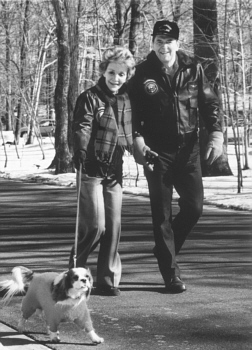
At Camp David with Rex.
When it came time to take Ronnie to the operating room, I walked with him and held his hand while he lay on the gurney. Jim Brady was on a gurney just behind him. It was the first time I’d ever seen anybody who’d been shot in the head, and it was a terrible sight; his head was so swollen. I was taken upstairs to a larger room, where there were a lot of people and the television sets were on, and they asked me if I wanted to go to the chapel. I said yes. In the chapel, I saw Sarah Brady. It was the first time that I’d ever met her, you have to remember. We’d only been in the White House for three months, and I hadn’t yet had a chance to meet everybody. She said to me, “They’re strong men. They’ll get through this.” It was obvious that she hadn’t seen Jim. And I certainly wasn’t going to tell her.
I said, “Yes.” We prayed together, and then I went upstairs.
As we waited, I looked out the window and saw how, in the buildings all around the hospital, people had thrown sheets out the window saying things like
GET WELL
,
MR. PRESIDENT
and
WE LOVE
YOU
,
MR. PRESIDENT
. Every now and then, a nurse would come and report to me on Ronnie’s progress. At first, the doctors were having trouble finding the bullet, which was a devastator bullet, the kind that explodes inside. One time, the nurse came and said, “We just can’t seem to get it out. We may just have to leave it in.” Well, that didn’t sound so good to me. And then another time, she said, “They’ve found it, but the doctor is having a hard time removing it—it keeps slipping from his fingers.” Finally, she came back and told me that the doctor had gotten it out; but I almost lost him then. The bullet had been lodged an inch from Ronnie’s heart.
We were lucky—we didn’t realize how lucky, in fact—because when Ronnie had arrived, all the doctors were in the hospital for a meeting. No one had to be called in. Everyone Ronnie needed was right on hand, and there was no waiting.
When Ronnie woke up, Ron and Doria were with me. Ron had been out touring with the Joffrey Ballet when he’d heard the news, and a plane was sent for them right away. The other children would arrive in the middle of the night, after the White House sent a military plane to pick them up.
When we walked into the recovery room, Ronnie had a tube down his throat. He felt like he couldn’t breathe. He gestured to us, and wrote a note saying, “I can’t breathe.” I panicked and ran over to the doctors and nurses, saying, “He can’t breathe!” But Ron just went over to him and calmly said, “Dad, it’s okay. It’s like when I went scuba diving. A machine takes over for you and does the breathing for you. It’s okay.”
But it was very frightening for all of us, including Ronnie.
I stayed at the hospital until the doctors said that Ronnie needed to sleep and that I should leave. I wanted to stay there all night, but the feeling was that it would be better for the country if I left and went back to sleep at the White House. Otherwise, people would have assumed the worst and there would have been panic. As it was, Ronnie’s aides had to do all they could to calm the country down. The briefings made to the press were partial, to say the least. The assassination attempt was really a much closer call than people were led to believe at the time. Everyone was trying not to frighten the people in the country, but the fact was, Ronnie almost died. It was a miracle that he didn’t. And I knew all along how serious things really were.
Looking back, I realize that when I went back to the White House, I was in shock. You never think your husband might be shot—you think that he might get sick, maybe, but not shot. And to me, even after it happened, it simply seemed unimaginable. That night, I slept on Ronnie’s side of the bed. It made me feel closer to him somehow. And it kept me from reaching out and touching an empty space.
After Ronnie was shot, my desire to protect him just increased. His aides wanted to get him out there talking again as soon as he could. I kept saying he should be treated like any other patient and given time to recover. After all, we had almost lost him. He was a strong man and he was mending well, but he wasn’t superhuman.
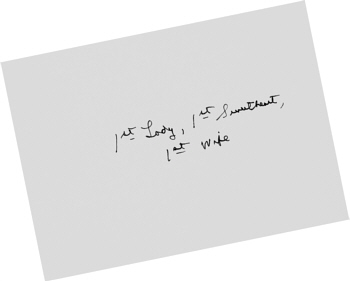
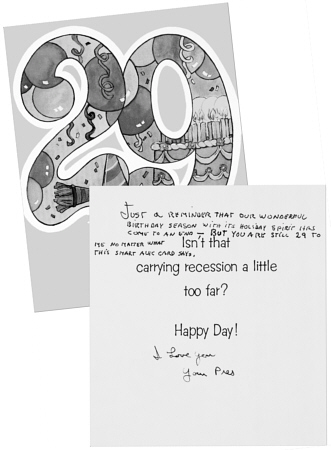
A birthday greeting.
An incident like that makes you feel very fragile. The shooting only took two seconds. And you suddenly realize that two seconds is all it takes for your life to change entirely. Our security tightened after the assassination attempt, as it had to. Oddly enough, death threats increase after a shooting—it seems there’s always somebody out there saying to himself, “Well, he didn’t get him, but I will.”
Needless to say, I was terrified.After the shooting, every time Ronnie walked out the door to make a public appearance, my heart would stop—and it wouldn’t start again until he came back home safely. Ronnie knew how scared I was. But if he was frightened too, he never let me know it. As always, he was cheerful and optimistic. God had spared him, he believed; there had to be a reason why. By making jokes—as in this letter—he tried to take the edge off my fear.
THE WHITE HOUSE
WASHINGTON
Dear First Mommie
I’m in Wyoming, Montana,—or Nevada depending on what time you read this.
But I’ll be at Camp David at 9:15 P.M Fri. Night. I’ll be so glad to see you. I miss you—even when I’m asleep. This is a very lonesome place when you are someplace else.
Now I don’t want this to come as a shock to you—but—well—well—I’ll just come right out with it—I’m in love with you. There I’ve said it & I’m glad.
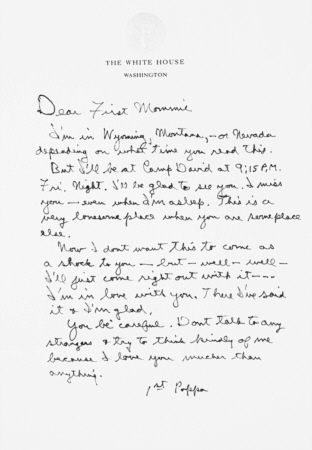
A note before we were to meet each other at Camp David.
You be careful. Dont talk to any strangers & try to think kindly of me because I love you mucher than anything.
1
st
Poppa
The assassination attempt made us realize how very precious our lives were. It made us all the more devoted to each other. I think this comes through very strongly in Ronnie’s Christmas letter of 1981, written nine months after the shooting.
THE WHITE HOUSE